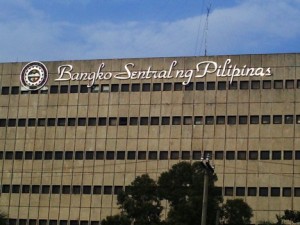
Bangko Sentral ng Pilipinas is expected to slash key interest rates to new record lows within 2012 or as early as this week’s monetary policy meeting, given the trend of global easing to cushion against external economic shocks.
Financial markets are increasingly betting that the Bangko Sentral ng Pilipinas will slash key interest rates to new record lows within the year or as early as this week’s monetary policy meeting, given the trend of global easing to cushion against external economic shocks.
Three big foreign houses—JP Morgan, ING Bank and Goldman Sachs—recently issued research reports anticipating the BSP to resume its “dovish” stance or bias for easier monetary policy. Early this year, the BSP reduced its overnight borrowing rate by 50 basis points back to an all-time low of 4 percent.
In various reports last week, JP Morgan projected a 25-basis-point cut by September at the latest but said it could not rule out a reduction as early as this month’s policy rate setting on July 26.
In a global markets commentary dated July 12, investment bank Goldman Sachs said the ability of the central banks in Malaysia, the Philippines and Taiwan to ease rates in the face of a global slowdown was complicated by the fact that current activity indicators for Malaysia and the Philippines suggested that activity was well above trend. However, if the global growth outlook deteriorates, each central bank may decide that a preemptive cut is necessary, the research said.
“The BSP may use the opportunity of weak global growth and well-contained domestic inflation to cut rates and continue the secular decline in policy rates, which would also ease the attractiveness of Philippine carry and sterilization costs,” Goldman Sachs. The investment bank was suggesting that to temper speculative flows to Philippine peso-denominated assets, the BSP may decide to slash interest rates.
ING senior economist Joey Cuyegkeng, in a July 9 report, said adjustments could be made at the next monetary setting on July 26.
“Monetary policy would continue to be vigilant as the softer inflation environment gives policy makers more leeway to adjust policy settings,” Cuyegkeng said, noting that adjustments may be made to moderate currency speculation.
However, the economist said: “There is no compelling reason for now to cut policy rates as growth prospects remain bright despite difficulties in developed markets.”
In its July 16 Asia-Pacific Equity Research, JP Morgan said a key driver to the potential rate cut by the BSP was moderating inflation, which has consistently fallen at or below the BSP’s targeted range of 3-5 percent over the past several months.
“Underpinning the moderating inflation is the decline in oil prices, where the Philippines is a standout in Asia as a country importing nearly all its requirements and having minimal subsidies,” the JP Morgan research said.
Likewise helping the rationale for a rate cut even more, JP Morgan said, was the recent underwhelming remittances, where growth has slowed versus the earlier months of the year, noting this could otherwise lead to a rather “subdued” consumption and “unspectacular” economic growth.
JP Morgan said the prospect of a rate cut was supportive of its “overweight” rating (buy more than the prescribed allotment by the benchmark index) on Philippine equities. “We like the market on its improving corporate earnings prospects, as well as accelerating investments that would include a decent outcome for the government’s public private partnership (PPP) infrastructure program,” the report said.
Under this environment of declining interest rates, JP Morgan said property followed by banks would be the biggest beneficiaries.
“Among property companies, the fundamental improvements should be felt most by those with predominantly residential segment driven. These would be the likes of Ayala Land, Filinvest Land and Megaworld. Meanwhile, banks to a lesser extent benefit through a reduction in funding costs with their high-cost deposits. Good examples would be banks with above average LDRs [loan-to-deposit ratios] such as Banco de Oro and Security Bank,” the research said.
The property counter in the Philippine Stock Exchange rose 1.68 percent on Friday as the market started to price in a fresh BSP policy rate cut. This lifted the main-share Philippine Stock Exchange index by 21.52 points, or 0.41 percent, to finish at 5,210.89.
On the other hand, BDO chief strategist Jonathan Ravelas noted in a commentary on Friday that short-term benchmark interest rates sharply declined throughout the week “on speculations that the BSP may cut rates as early as next week to cool currency gains that threaten exports and at the same time ensure growth momentum is sustained.”
“In light of a prospective rate cut, we expect rates to continue to move sideways to down in the week ahead,” Ravelas said.